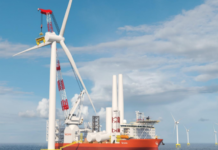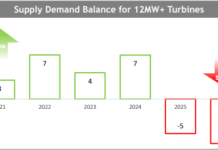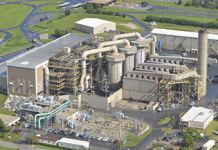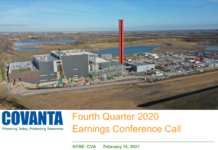The Algonquin Power Income Fund (AGQNF.PK) has been one of my star performers in an excellent year. Is it still a good investment at these prices?
Since I recommended the Algonquin Power Income Fund (AGQNF.PK/APF-UN.TO) in January as a renewable energy income stock for 2009, the company is up 69%, in addition to the C$0.02 monthly dividend, worth approximately another 8% through August on the US$1.82 purchase price, making it the second-best performing of my ten picks (after Cree, Inc (CREE).) However, since the major basis for my recommendation at the time was the stock’s extremely cheap valuation and high yield, I thought it was worth revisiting, on the occasion of the company’s Q2 update [pdf].
Major events in the first half were Algonquin’s planned acquisition of a 50% stake in California Pacific Electric Company (Calpeco), the former California assets of NV Energy (NVE), and the fund’s plan to convert into a corporation and acquire some tax loss assets through a deal with Hydrogenics Corporation (HYGS).
Calpeco
The Calpeco deal gives Algonquin some exposure to electricity transmission and distribution (in which their partner Elmira has management expertise) in addition to their current exposure to renewable energy generation. Since I like the potential opportunities in electricity transmission, I think this was a step in a good direction for Algonquin. Furthermore, about half of Algonquin’s stake in Calpeco will be financed with an equity investment in Algonquin from Elmira at C$3.25 per unit. Since this is only slightly below the current price, and well above the price at which I recommended the stock, the transaction will be non-dilutive for both me and my readers, and a reasonable exchange for more recent investors.
Hydrogenics
In July, a reader worried that the deal with Hydrogenics was a bad idea because Hydrogenics is a fuel cell company, an alternative energy sector neither of us is enthusiastic about. In fact, this is a short term deal, and shareholders need not be concerned with ending up owning a fuel cell company when they thought they owned a renewable energy power producer. Despite the legal complexity, this deal is not a tie-up with Hydrogenics, but rather a way for Algonquin to acquire corporate status, and Hydrogenics’ tax loss assets at the same time. Because Algonquin is profitable, and Hydrogenics is not, these tax loss assets are valuable to Algonquin, but not Hydrogenics, allowing both companies to benefit. Algonquin will gain the benefit of Hydrogenics previous losses in exchange for a cash payment, which will allow the cash-poor, unprofitable company to continue operations. The transaction has been approved by Algonquin unitholders and Hydrogenics shareholders, and awaits regulatory approvals.
Results
 The Trust’s first half revenue was down compared to 2008, which management attributes to lower natural gas prices. Gas prices affect the trust’s revenues through lower contract prices for the heat from their thermal generation units. I find this to be a good sign, since I expect that low current natural gas prices will rebound because they do not provide sufficient incentive for natural gas companies to drill and replace the gas supply from depleting wells. Although I expect that low natural gas prices will depress revenues in the short term, Algonquin’s operating cash flow and earnings should continue to be easily sufficient to fund distributions to unit holders with plenty left over to fund Algonquin’s growth plans.
The Trust’s first half revenue was down compared to 2008, which management attributes to lower natural gas prices. Gas prices affect the trust’s revenues through lower contract prices for the heat from their thermal generation units. I find this to be a good sign, since I expect that low current natural gas prices will rebound because they do not provide sufficient incentive for natural gas companies to drill and replace the gas supply from depleting wells. Although I expect that low natural gas prices will depress revenues in the short term, Algonquin’s operating cash flow and earnings should continue to be easily sufficient to fund distributions to unit holders with plenty left over to fund Algonquin’s growth plans.
At current prices of C$3.32 for APF-UN.TO and US$3.07 for AGQNF.PK, with a yield of 7.2%, I consider Algonquin to be reasonably valued, and continue to hold my positions. However, because I currently expect a market decline, I would only suggest buying Algonquin today if you also hedge your position against general market moves.
DISCLOSURE: Tom Konrad and/or his clients have long positions in AGQNF.
DISCLAIMER: The information and trades provided here and in the comments are for informational purposes only and are not a solicitation to buy or sell any of these securities. Investing involves substantial risk and you should evaluate your own risk levels before you make any investment. Past results are not an indication of future performance. Please take the time to read the full disclaimer here.










So AGQNF.PK is still a renewable income stock? I could have sold it out the other day.
Yes… their business will not change as a result of the Hydrogenics deal. They’re still mostly in clean energy and water infrastructure.
Thanks Tom,
I don’t know whether I’m envious of your well-timed recommendation for this stock or that it is somehwat biased since your coverage begins very close to the 52-week low. Yes, a 69% gain plus dividends is great since January, but relatively speaking, the market has responded in a similiar fashion, has it not? I do like your review of the complicated Hydrogenics deal. The partnership with Emera provides more experience on the board, which other followers of this stock find as a relief. I first became interested in this company since they are well diversified in the renewable energy/water infrastructure sectors. I think this is a good long term stock, and this will depend somewhat on their growth strategies, but also their current size of debt.
Disclosure: Long position in APF.UN. Bought in just before the crash and received one nice dividend payment before the cut! (average price $4.50 -but not too bitter).
Good update.
While I like the company, and I appreciate that you brought it to my attention earlier this year, I am now out.
I agree with you. I think the market will drop. Regarding agqnf I note that MACD is crossing downward and the uptrend of the stock price has been broken. Could just be consolidation. But, could also be setup for a bit of a reversal.
Brad,
My timing is not usually this good… I, too, owned some of this before the crash (bought in 2006), which is why I was paying attention when it became so cheap in December. I’m not trying to brag about my timing, however… consider my
recent
recommendation and un-recommendation of
Raser.
Regarding the performance of the market, it’s up over 50% since the early
March lows, but I made this pick at the end of December. The S&P
500 is only up 18% since then.